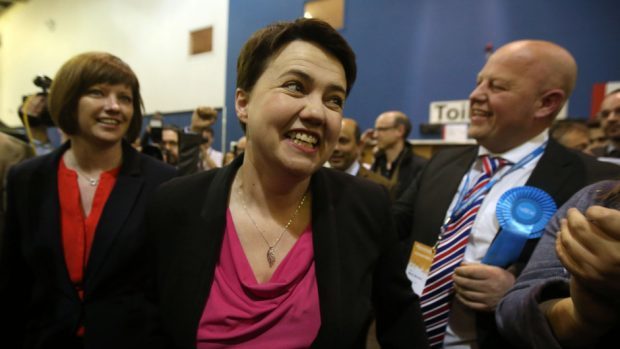While the race for second place in the Holyrood elections is far from won, it has certainly been Ruth Davidson’s party so far.
In one of the biggest surprises of the night, the leader of the Scottish Tories seized the Edinburgh Central constituency from the SNP.
Her party currently has six seats to Labour’s three and is only marginally trailing in the share of the vote.
That represents a gain of four seats for the Tories and a loss of 11 for Labour.
Ms Davidson’s victory came minutes after Kezia Dugdale’s defeat in Edinburgh Eastern.
A broad grin spread across her face as she took to the podium to chants of “Ruth, Ruth, Ruth, Ruth”.
In the days leading up to polling day, she boldly declared her party would replace Labour as the main opposition in the Scottish Parliament.
And as it stands, the chances look good.
If she pulls it off, it will be an historic triumph, a “seismic change” as Scottish Secretary David Mundell described it earlier in the night.
To be properly appreciated, Ms Davidson’s constituency win should be evaluated in the context of Labour’s dominance in Scottish politics throughout the second half of the 20th century and – from a Westminster point of view – until recently.
The Scottish Conservatives have fared better in the Scottish Parliament, helped of course by the proportional representation system of election, although lost seats in 2011.
It should also be set against the backdrop of the Scottish electorate’s complete and utter rejection of the Tories at last year’s general election when the party again won just a single seat.
To win the silver medal would certainly be the icing on the cake – but even if it doesn’t happen, Ms Davidson’s certainly on the up.
So what’s behind her appeal?
Since getting behind the wheel, the MSP has shown she’s not afraid to chart her own path.
Most recently, she urged the UK to take in unaccompanied child refugees in Europe while David Cameron was arguing against such a move.
And at Prime Ministers Questions this week, in the face of a defeat at Westminster, he climbed down on the issue, agreeing to accept those registered in France, Italy and Greece before the EU’s deal with Turkey.
Coupled with this ability to stand apart to some degree, there’s her personality. She has the like-ability factor.
It has led some to suggest she could now end up being a victim of her own success, possibly drawn south of the border when Mr Cameron stands down.
Ms Davidson has repeatedly batted away the idea and thrown her weight behind a campaign for the PM to stay on as Tory leader in the party’s bid for another term in 2020.
But even Mr Cameron – when asked last year – hinted at the prospect, saying he doesn’t put a limit on her ambition.
Whether she is interested or not, this election is doing her cause no harm at all.

